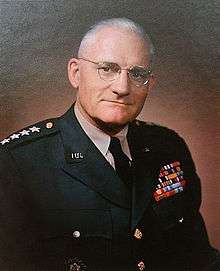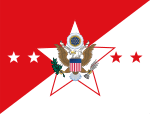Williston B. Palmer
| Williston B. Palmer | |
|---|---|
 General Williston B. Palmer | |
| Born |
November 11, 1899 Chicago, Illinois |
| Died |
November 10, 1973 (aged 73) Walter Reed Army Medical Center |
| Allegiance |
|
| Service/branch |
|
| Years of service | 1919–1962 |
| Rank |
|
| Commands held |
82nd Airborne Division 2nd Armored Division X Corps |
| Battles/wars | World War II |
| Awards |
Distinguished Service Medal (4)[1] Silver Star[2] |
| Relations |
Charles D. Palmer (brother) William E. Birkhimer (grandfather) |
Williston Birkhimer Palmer (November 11, 1899 – October 11, 1973) was a United States Army four-star general who served as Vice Chief of Staff of the United States Army (VCSA) from 1955 to 1957; Deputy Commander in Chief, United States European Command (DCINCEUR) from 1957 to 1959; and was the first Director of Military Assistance, 1959 to 1962. His brother Charles D. Palmer, was also a four-star general, the first pair of brothers in Army history to achieve this, and his grandfather, William E. Birkhimer was a Brigadier General and Medal of Honor recipient.
Military career
Palmer was born in Chicago, Illinois on November 11, 1899, the oldest son of Colonel Charles Day Palmer. He graduated from the United States Military Academy in 1919 after an accelerated 3-year course.
During World War II, as a brigadier general, he commanded VII Corps artillery, from the Normandy invasion to the Elbe. In January 1943 Then Brigadier General Palmer was a passenger on a B-17 which landed in neutral Ireland. He was transferred across the border to Northern Ireland the next day. .[3]
Following the war he served as Director of Logistics, European Command, commanded the 82nd Airborne Division in 1950, followed by command of the 2nd Armored Division in 1951 and X Corps in Korea later that same year.
During his tenure as Director of Military Assistance, a scandal erupted over black market activities in Turkey involving military personnel. Palmer defended soldiers who refused to testify to the Senate by pointing out that the Uniform Code of Military Justice protected soldiers from self-incrimination.
He caused controversy when in October 1960, while visiting Saigon, he said the United States was suspending military aid to Laos because of the "confused situation" in there, saying "we have not been sure who is responsible for anything." After two days of confusion, the U.S. embassy in Vientiane said the announcement had been incorrect and made without instructions from Washington, D.C.
During his time as Vice Chief of Staff, in order to save money, he issued an order ending the horse drawn caissons in Arlington National Cemetery. However, his order was countermanded. He retired from the army in 1962.
Palmer died on died November 10, 1973, at Walter Reed Army Medical Center in Washington, D.C. He never married, and was buried with his mother in Arlington National Cemetery, and was later joined by his brother.[4]
References
- ↑ Hall of Valor awards
- ↑ Palmer Silver Star
- ↑ Paul Browne (2010). "Eagles Over Ireland". Paul Browne. Retrieved 2013-01-13.
- ↑ Arlingtoncemetery.net entry
External links
-
 Media related to Williston B. Palmer at Wikimedia Commons
Media related to Williston B. Palmer at Wikimedia Commons
| Military offices | ||
|---|---|---|
| Preceded by Gen. John E. Hull |
Vice Chief of Staff of the United States Army 1955 – 1957 |
Succeeded by Gen. Lyman Lemnitzer |

